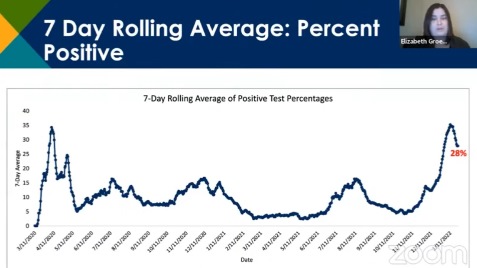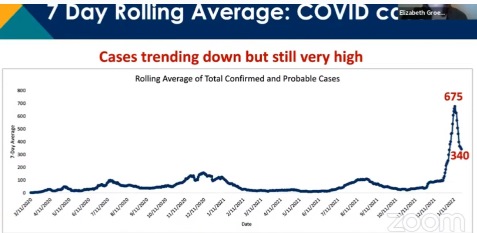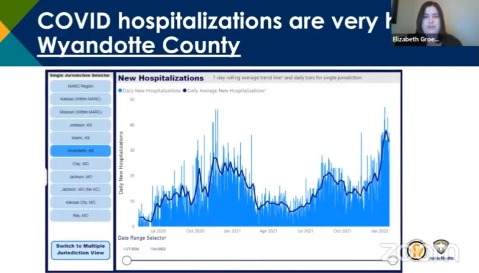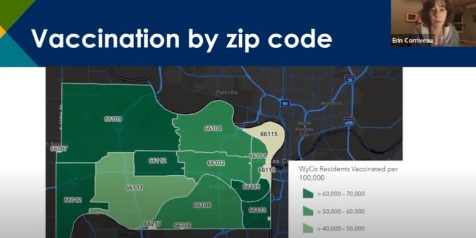



COVID-19 cases are averaging about 340 a day in Wyandotte County, according to the Unified Government Health Department.
While COVID rates peaked about Jan. 11 in Wyandotte County at about 645 per day, they are still higher than the average case rate has been in this pandemic, according to Health Department officials who made a presentation at the Thursday night Unified Government Commission meeting.
Even though the number is trending down, case numbers are still very high, said Elizabeth Groenweghe, chief epidemiologist for Wyandotte County.
The percent positivity numbers peaked at 35 percent Jan. 11 and are at 28 percent now, which is still a very high percentage, she added. Percent positivity is the number of tests coming back positive. The CDC classes anything above 10 percent as a “red zone,” high community transmission of the coronavirus.
Hospitalizations lag a bit behind the case numbers, she said. While there is a decrease in case numbers, it will be some time before the hospitalization rates come down, she said.
Across Greater Kansas City, all hospitals collectively are seeing the highest numbers of hospitalizations so far in the pandemic, she said.
“The hospitals are truly in a crisis situation right now,” Groenweghe said.
It is at the highest point of the entire pandemic, she said. Hospitals also are battling short staffing, burnout, and shortages on medications and supplies, she said. Medications used to treat COVID right now are in very short supply, she added.
“Right now hospitals are canceling primary care visits, or rescheduling them, people aren’t getting their cancer screenings, things like that that are essential for the community,” Groenweghe said.
People going into the emergency room are having long waits, and it’s not uncommon to wait three days for a room to open for them, she said.
She said EMS had transported a patient who had a heart attack to a hospital, but because the hospital was on diversion, it did not accept the patient. Then the patient died en route to a second hospital, without receiving the hospital emergency care the patient needed, she said.
Wyandotte County has 446 COVID resident deaths since the pandemic started, which includes 20 deaths in December and 30 deaths in January so far, she said. Wyandotte County is averaging one death a day in January due to COVID, she added.
The average age of COVID deaths now is 64 in Wyandotte County, she said, and about half the deaths are under 64. It is a misconception that people who are dying are elderly and frail, she said.
Dr. Allen Greiner, chief medical officer for Wyandotte County, said vaccination significantly reduces hospitalizations and deaths.
The majority of those who are hospitalized for COVID are unvaccinated, he said.
“You can see tht vaccination in this country has prevented a whole lot of deaths, and hospitalizations,” he said.
Hospitalizations are 16 times higher in unvaccinated adults, and unvaccinated adults are at a 68 times higher risk of dying than those who are not, he said.
While there was good news about the number of omicron cases declining here, there is a need for a long-term planning against the virus, according to Dr. Greiner.
The vaccination campaign will be an ongoing efforts, with probably an ongoing booster campaign, he said.
Wyandotte County residents with at least one dose total 60.3 percent, those who have completed their vaccines are 49.7 percent, and those who have received a booster dose, 16.3 percent.
He said they don’t want to blame people who haven’t received a vaccination, but they want a long-term, forward-thinking, positive approach to the future to convince people to change their minds and not give up.
Dr. Erin Corriveau, deputy medical director for Wyandotte County, said younger kids 5-11 years old and adults 25 to 34 years old are the categories of lowest vaccine rates.
The Health Department is holding vaccination events in workplaces, she said.
“We worry about those two age groups especially,” she said. “The young people are often driving the number of cases.”
They are getting infected and spreading the disease while they are out working and living their lives, she said.
Zip Code area 66111, which includes Edwardsville, has the lowest vaccination rate of the populated areas in the county, with 40,000 to 50,000 vaccinated, she said.
Zip Codes 66102, 66104 and 66106 are in the 50,000 to 60,000 vaccinated range. The Health Department will be working on having community-based vaccine events in these areas, she said.
There is a need to think about the community in the long term, she said.
“COVID is still a big deal, it’s still a pandemic, it’s still a massive situation in our community that seems really on fire, especially in the hospitals right now,” Dr. Corriveau said.
It’s a devastating time for a lot of people, it has upended schools, causing closures, and businesses have been short-staffed, she said. Hospitals have been overwhelmed, she said.
“What’s going to be key to moving us forward, and understanding we’re going to be living with COVID, although having times of incredible surge, again, we’ve got to increase our vaccination rates,” she said. “That is going to be the key.”
With increased vaccinations, there will be fewer people getting seriously ill and dying of the disease. They will work to increase the supply of monoclonal antibodies and antiviral treatments, to get them out to the residents when needed, she said.
“We’re going to work hard to be nimble,” she said. They will see new variants and will have to be responsive, ready to increase testing and get out to the community, and wear masks.
The Health Department said when everybody is not vaccinated and boosted, it’s easy to cut the chain of transmission when everybody wears a mask in indoor settings, she said.
The Omicron and upcoming variants will be extremely transmissible, and the Health Department recommends better quality masks, she said.
The Health Department is handing out over 300,000 KN95 masks in the community, she said.
“If you don’t get boosted, you’re more susceptible to Omicron and upcoming variants,” she said. It’s really important to get that 16 percent boosted number up, she added.
Although there are a lot of people in the community who have some natural immunity from having had COVID, it doesn’t last that long, and they should still get a booster shot, Dr. Corriveau said.
The Health Department will improve testing for the community, she said. Free tests are available at the old Kmart site at 7836 State Ave. and at the Kansas National Guard Armory at 18th and Ridge. They will continue to work with community organizations at other sites for vaccine and testing events.
Commissioner Christian Ramirez said his highest recommendation was for everyone to wear a mask. He has had family members who got COVID, he said.
“This is affecting lives,” he said. “There’s 446 people dead, that is mothers, daughters, brothers, cousins, grandmothers and grandfathers. This isn’t a video game. Those people won’t come out of it when the pandemic is over. So I highly, highly, encourage, recommend to the highest degree for you to get vaccinated and wear your mask, only then will we get through this. This isn’t a ‘me, myself and I’ – this is a ‘we.’”
He thanked health care workers, and said, “We have put the world on your shoulders to save us, but yet we refuse to do our part to help you. I cannot thank you enough for all you have done, and that you will do. You are on the front lines, we are not. You see everything that happens.”
There has been a death because of overcrowded hospitals, he said, citing the example of the patient who died while being transported to another hospital. At one school, they’re running out of substitutes and teachers, and have had to quarantine whole classrooms.
“We have to do our part as a community, moving together,” Commissioner Ramirez said.
Commissioner Gayle Townsend asked about the average age of individuals who are hospitalized.
Dr. Corriveau said at the University of Kansas Health System, where she also works, the age has decreased over the course of the pandemic. When they first talked about COVID, the age was quite elderly, and over time that age has come down quite a bit, and they are seeing people in their 30s, 40s and 50s at KU hospital, she added.
The average age of COVID patients at KU hospital is 56, she said.
Dr. Corriveau said, in answer to Commissioner Townsend’s question, that there isn’t any direction currently on how many vaccination shots may be needed in the future. Israel has started on its fourth dose of vaccinations, and the data will be helpful to look at before the United States starts on it, she said.
“I will predict we will need boosters going forward, I’m not sure how often,” she said.
The UG Commission did not make a motion or take a vote on anything related to the COVID report on Thursday, including the mask ordinance in Kansas City, Kansas, that they voted to end on Dec. 12.
COVID case numbers
On Thursday, Wyandotte County had 37,823 cumulative positive COVID cases, and 446 deaths, according to information from the UG’s COVID hub website. It was an increase of 184 cases and two deaths since Wednesday.
KU Health System on Friday morning reported a slight decrease in its COVID-19 hospitalization numbers, according to Dr. Dana Hawkinson, medical director of infection prevention and control. There were 107 active COVID inpatient infections, with 21 in the intensive care unit, 11 on ventilators, 104 other COVID patients in recovery, for a total of 211 COVID inpatients, he said.
He said he would feel a lot better when the numbers are down to 100 active infections in the hospital.
“Let’s hope this trend continues over the weekend,” he said, adding he hopes it’s a sign of good things to come.
Dr. Steve Stites, chief medical officer at KU Health System, said Friday that he hopes to see a decrease. A chief medical officer discussion earlier this week found a downturn in the trend for most hospitalizations, he said.
He said he knows 78,000 people will be gathering at a Chiefs’ game on Sunday, and added he would be wearing a mask except when he’s eating or drinking.
“At the end of the day, you do what you can to keep yourself safe, because the virus is still out there,” Dr. Stites said. “Even though our numbers are down, they’re still at an all-time high.”
“Omicron can spread really rapidly, it can still be dangerous,” he said.
The state of Kansas reported 722,824 cumulative COVID cases on Friday, and 7,522 cumulative deaths, according to Kansas Department of Health and Environment statistics. It was an increase of 12,986 cases and 134 deaths since Wednesday.
Free COVID testing and vaccines available
Free COVID testing and vaccines are available at different sites in Wyandotte County.
The former Kmart at 7836 State Ave. is open for free COVID vacines from noon to 6 p.m. Friday, Jan. 28.
Free tests also are available at the former Kmart from 9 a.m. to 3 p.m. Friday.
Free tests also are available from 8 a.m. to 8 p.m. Friday, Jan. 28, at the Kansas National Guard Armory, 100 S. 20th.
Vibrant Health has a free testing clinic at Oak Ridge Baptist Church, 9301 Parallel Parkway, from 8:30 a.m. to 4:30 p.m. Friday, Jan. 28.
For more information, see www.wycokck.org/covid-19.
To find other testing sites in Kansas, visit https://www.coronavirus.kdheks.gov/280/COVID-19-Testing.
To find other vaccine sites, visit https://www.vaccines.gov/.
